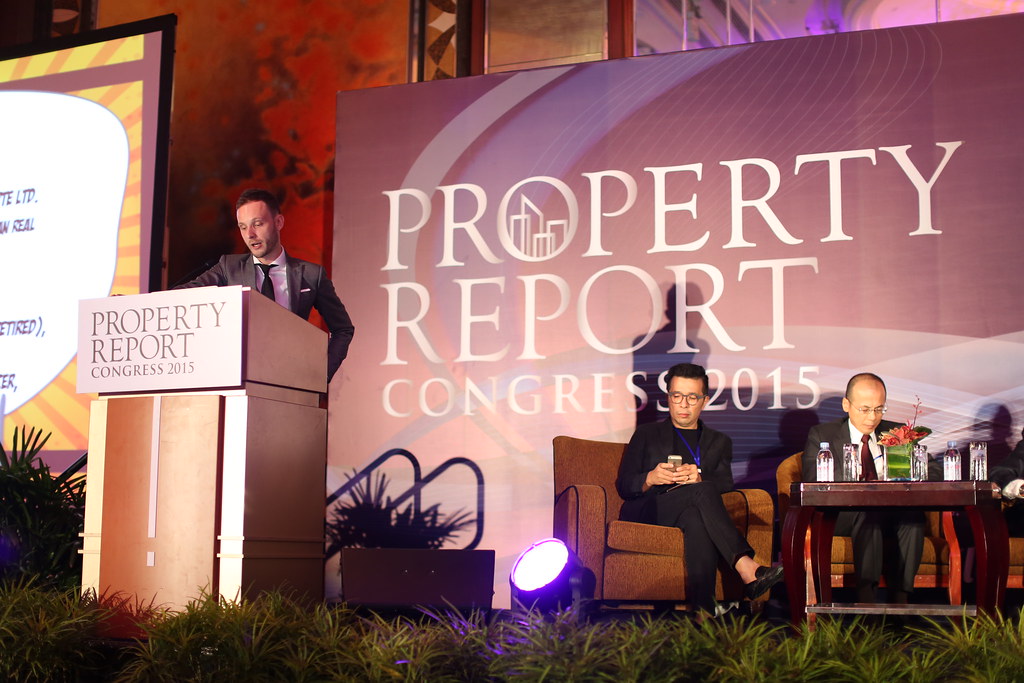7 things we learnt from the first Property Report Congress 2015
Lessons learned from Southeast Asia’s industry experts
Exactly seven days have passed since Southeast Asia’s top real estate leaders met at the inaugural Property Report Congress 2015, a high level forum to discuss the progress of the region’s dynamic real estate markets. The historic event held at the Shangri-La Hotel in Singapore was organised by Ensign Media, the company behind the prestigious Asia Property Awards programme, welcoming participants and expert panellists from Myanmar, the Philippines, Vietnam, Malaysia, Indonesia, Thailand and Singapore.
Here are seven things that we’ve learned from the conference, which has garnered positive feedback from industry leaders and professionals in ASEAN.
1—Governments have a lot to do with the advancement of the green movement.
According to keynote speaker Mark L. Clifford, executive director of Asia Business Council, the green building movement can move forward with the help of government policies. He cited several sustainable developments around the world, such as the popular Empire State Building in New York City and the Zero Energy Building in Singapore, as examples.
“Every society is going to have a different approach in green building and sustainability, but overall ‘going green’ is now a marketing tool – it is a way of creating awareness amongst Asian and global consumers,” he said, noting that among the Asian countries, Singapore is ahead than bigger economies like Japan and China, due to its high standards and government-led green certification initiatives.
“But China’s a real wildcard because in the last couple of years, particularly under the new administration of Xi Jinping, we’ve seen a lot more talk and action on climate change issues,” Clifford added. “There’s a lot of talk in terms of building codes, energy efficiency regulations, and the only question is: how much of this is enforced?”
The renowned green tech author reiterated that despite certain roadblocks, green building ultimately provides higher capital values, higher rental yields, and better tenant mix, which proves that green can be profitable.
2—The only way for Singapore to go is back up.
It’s been quite known in the last several quarters that Singapore’s real estate market is experiencing a lacklustre year, but that’s primarily due to the country’s own cooling policies.
“One of the reasons why our forecast for Singapore is a little bit gloomy is a confluence of factors in the Singaporean (high-end) market. There’s a lot of supply coming in,” said Nicholas Holt, Asia Pacific head of research at Knight Frank.
He explained that the oversupply, especially in the high-end residential market, would bottom out in the coming year. Singapore would then come back up as the “market has been through the pain, essentially” and as it reaps from the benefits of being the hub of the forthcoming ASEAN Economic Community (AEC).
“Singapore is still a very attractive destination, for both high-net-worth Singaporeans and the international buyers. It’s a very transparent market; for Indonesians and Malaysian, they’ve always bought here. So we don’t feel it will have much impact on pricing after 2016, when we feel the market will bottom out,” Holt noted.
3—Vietnam is hot. Really hot.
Expert panellists were asked throughout the Property Report Congress on the choice top markets for next year. Based on their predictions, Vietnam is the runaway winner in 2016, with eight panellists voting for the ‘comeback kid’ of the industry, double the votes for the Philippines and Indonesia, which tied for the runner-up position.
“We are seeing a lot of confidence on the market, not just from the buyers but also from the Vietnamese developers. We’re seeing a lot of launches coming up, even mega-projects coming up; some projects are 10,000 units,” said Rudolf Hever, executive director, Alternaty Real Estate (Vietnam).
Hever then asked if the Vietnamese market should start worrying about oversupply? “I think it’s still in the early days.” The only thing that developers and investors in the country right now should look out for is the potential impact of the reformed Law on Residential Housing in the coming year.
Keynote speaker Holt, who was excluded from the survey, described Vietnam as “one of the bright spots in the region” in 2016, in terms of economic progress, GDP growth and real estate outlook.
4—The office market is in.
In the Philippines, the panellists unanimously agreed that the country’s 2016 market performance would generally be the same. The office segment will continue its robust performance, as the country’s business process outsourcing and information technology sectors gain more momentum.
The hot office sector in the Philippines has also impacted the strong retail segment, which subsequently impacts the mid-to-high-end residential segments, where Overseas Foreign Workers (OFWs) have a high demand for condominiums, and the increasingly becoming popular branded residences.
Premium and Grade-A office developer The Net Group’s executive vice-president, Ramon Fernando D. Rufino, disclosed that construction costs have gone up due to the bullish market growth. “Contractors actually turn developers down because they can no longer handle the workload. There are times that they also do not bid on projects anymore.”
Elsewhere in the region, some developers are even tapping into the Grade-B office segment. Trinh Bao Quoc, CEO of SonKim Land, said that in Ho Chi Minh City (HCMC), there is a growing market for Grabe-B office space. There is also an abundance of office supply, but vacancy rate is still quite low at less than three percent. In Hanoi, there is a demand to build more Grade-A offices as the entire market witnesses a revival.
5—China’s economic slowdown will definitely have an impact on ASEAN. Or maybe not.
It really depends on who was asked. Some local experts, like those in Vietnam, agreed that the economic downturn of the Chinese Mainland could have some side effects on their domestic market. Boon Kuah Chia, the recently retired CEO of GuocoLand, said the Mainland is a major partner of Singapore, and so the
“China is a major importer in Myanmar,” said Chinese investor Dr. Stephen Suen, chairman and founder of Marga Global, which has been bullish on the Burmese market. “But I think the impact of the China slowdown would be short-term only.”
Panelists in the Philippines didn’t think that the China slump would not have negative effects on the market. Rather, the situation has allowed the Philippine construction companies and developers to import lower-priced building materials made in China, which could help in bringing down the escalating construction costs.
Experts in Thailand all said that Chinese investors were looking to spend their money outside the Mainland, and Thailand would benefit from that as the number of Chinese tourists continue to rise, and China looks set to overshadow the highly active Japanese and Russian demographics.
Clayton Wade, managing director of Premier Real Estate, noted that there was an oversupply in a number of areas in Kingdom, but “we very glad that we see an emerging market with the Chinese, who will very likely to pick up the slack.” He also cited the USD48 billion worth of investments made by the Chinese in the United Kingdom, which implied that China’s slowdown wouldn’t act as a hurdle for their outbound activities.
6—Infrastructure can make a difference.
Property experts in Indonesia look forward to a generally better 2016, after having witnessed a roadblock in the local markets following a very strong last couple of years that ended with the election of a new administration. Candra Ciputra, CEO of Ciputra Group, said that with infrastructure projects in the pipeline and possible reforms in the real estate sector, such as ownership rules, Indonesia would bounce back.
Khalil Adis, founder, Khalil Adis Consultancy Pte Ltd, echoed the same sentiment. He said the opening of the Indonesian sector, could very well reinforce the hot markets of Jakarta, Bali and Bintam. Harry Gunawan, president director of Kencana Graha Global, added that the national tax amnesty next year would further compel investors to support the Indonesian markets.
7—Southeast Asia will not become a ‘Walking Dead’ region.
There are a lot of things to look out for in Southeast Asian markets in 2016, as summarised by Knight Frank’s Holt, that will make the entire region a very dynamic destination for real estate investors.
In Indonesia, the debate on the luxury and super luxury tax, and discussions to allow foreign buyers to purchase condominiums, will continue, while in Singapore, stamp duties would be the talk of the industry.
Malaysia will see the effects of the Goods and Services Tax (GST), as well as the Budget approval that could have an impact on the progress of their currently flat domestic property sector.
For Thailand, the government stimulus in the sector could jumpstart the local market, while for Vietnam, the impact on Law on Residential Housing may start to manifest after one year of being implement.
Holt also noted that the Philippines would continue to perform well next year. Cambodia’s relatively open emerging market is still small and undersupplied with lots of speculators, but there would be demand from investors in Singapore, Hong Kong and Taiwan.
What do you remember the most from the Property Report Congress 2015? Tell us about it!
Recommended
6 green real estate projects reshaping Asia’s future
Developers are being incentivised to push a green agenda into daring new realms
ARES White Paper Volume 3: The era of adaptive reinvention
Pioneering sustainable and innovative practices in urban development
ARES White Paper Volume 2: Unravelling the power of data revolution in real estate
Insights on proptech, smart cities, and sustainable development
ARES Digital White Paper Volume 1: The fundamentals of responsible building
Green and climate heroes join forces to discuss how Asia Pacific can weather the current environmental crises and the looming effects of climate change







